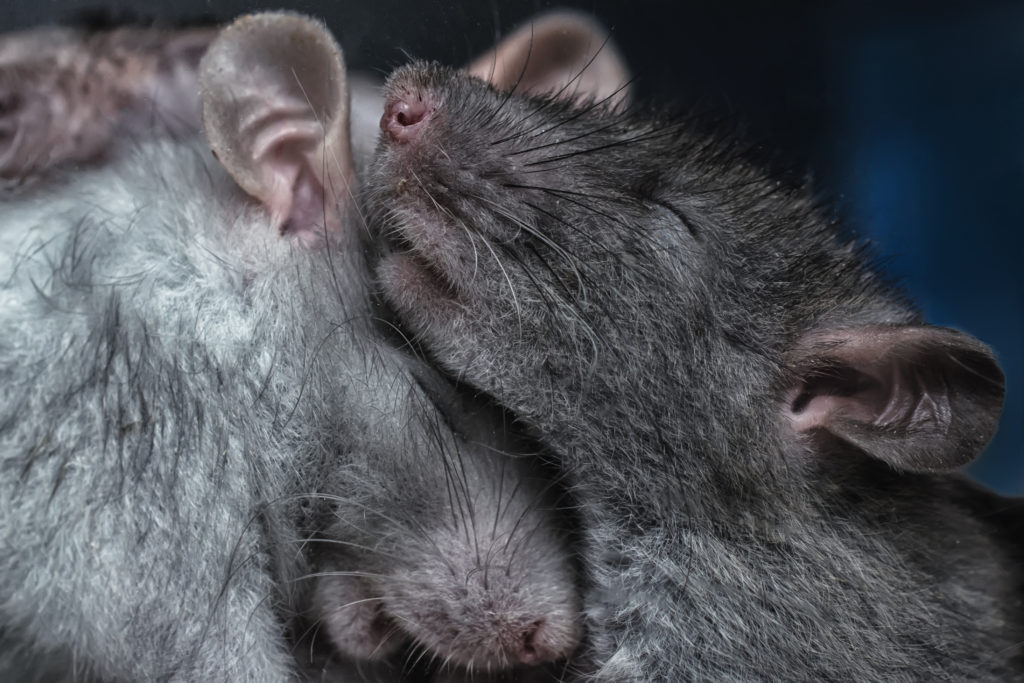Quick Hits
Daily brief research updates from the cognitive sciences

I have reported in other places on the social regions of the brain (for review see here). And this has indeed been the standard approach – try to identify the specific regions in the brain that engage in a particular activity.
However, this research adds an interesting twist to the concept of the social brain. Japanese researchers at Tohoku University and the University of Tokyo have discovered electrical brain wave patterns related to social behaviour in mice.
What did they find?
First, they found that there was a brain wave signature in social interactions. These came from regions we already know are associated with social behaviour namely a region called the medial prefrontal cortex, in the front of the brain, associated with social behaviours, and the amygdala which is well-known as an emotional and attentional centre.
When mice were socialising theta waves (slow waves) decreased and gamma (fast waves) increased. This is in itself interesting and gives another neural signature that is easier to measure than brain scanning. But mice that had poor social skills or that exhibited signs of depression or autism (yes, you can measure this in mice) lacked this brain wave pattern.
The critical question is: can these brain waves patterns actually influence social behaviour? Through optogenetics the researchers were able to stimulate the social brain wave patterns in these social dysfunctional mice and yes, their social behaviour normalised.
In short, a pretty amazing piece of research that shows that brain waves are critical to social interactions, and these can also be manipulated (in mice that is) to improve social behaviour. Not in humans yet, unfortunately!●

Andy Habermacher
Andy is author of leading brains Review, Neuroleadership, and multiple other books. He has been intensively involved in writing and research into neuroleadership and is considered one of Europe’s leading experts. He is also a well-known public speaker speaking on the brain and human behaviour.
Andy is also a masters athlete (middle distance running) and competes regularly at international competitions (and holds a few national records in his age category).
Reference
Nahoko Kuga, Reimi Abe, Kotomi Takano, Yuji Ikegaya, Takuya Sasaki.
Prefrontal-amygdalar oscillations related to social behavior in mice.
eLife, 2022; 11
DOI: 10.7554/eLife.78428
More Quick Hits
Brain Scans Can Predict Your Political Affiliation
Quick HitsDaily brief research updates from the cognitive sciences rain scanning of political partisans is not new and it has long been reported that brain scans can predict political affiliation. But those studies were scans of political partisans...
Children with Same-Sex Parents Are Socially Well-Adjusted
Quick HitDaily brief research updates from the cognitive sciences his is not the first study to report that children of same-sex parents are well adjusted, there are plenty, but it is one of the first to be representative and hence gives some...
Simple Exposure to New Things Makes Your Brain Ready to Learn
ouldn’t it be great if we could learn things with no effort? Well, actually we often do, and children learn vast quantities of information, and knowledge with little to no effort – think of how well we learn languages which become fiendishly...
So, Can Cranberries Improve Memory?
tend to be hesitant to report on studies of single foods doing amazing things (because many do), but this piece of research still caught my eye. So, what did this group of researchers from the University of East Anglia find? Well, they...
The Real Problem with Social Media: It Induces Dissociative States
Quick HitsDaily brief research updates from the cognitive sciences ocial media seems to hijack our brains – or at least according to popular narratives. Most of us have experienced this where you get stuck in an endless stream of content,...
Adventurous Play Boosts Mental Resilience in Kids
o, a simple cheap way to help your kids improve all life skills and strengthen mental wellbeing. Too good to be true? Well, this piece of research, just out, finds a fascinating correlation with mental health and kids. This correlation was...






